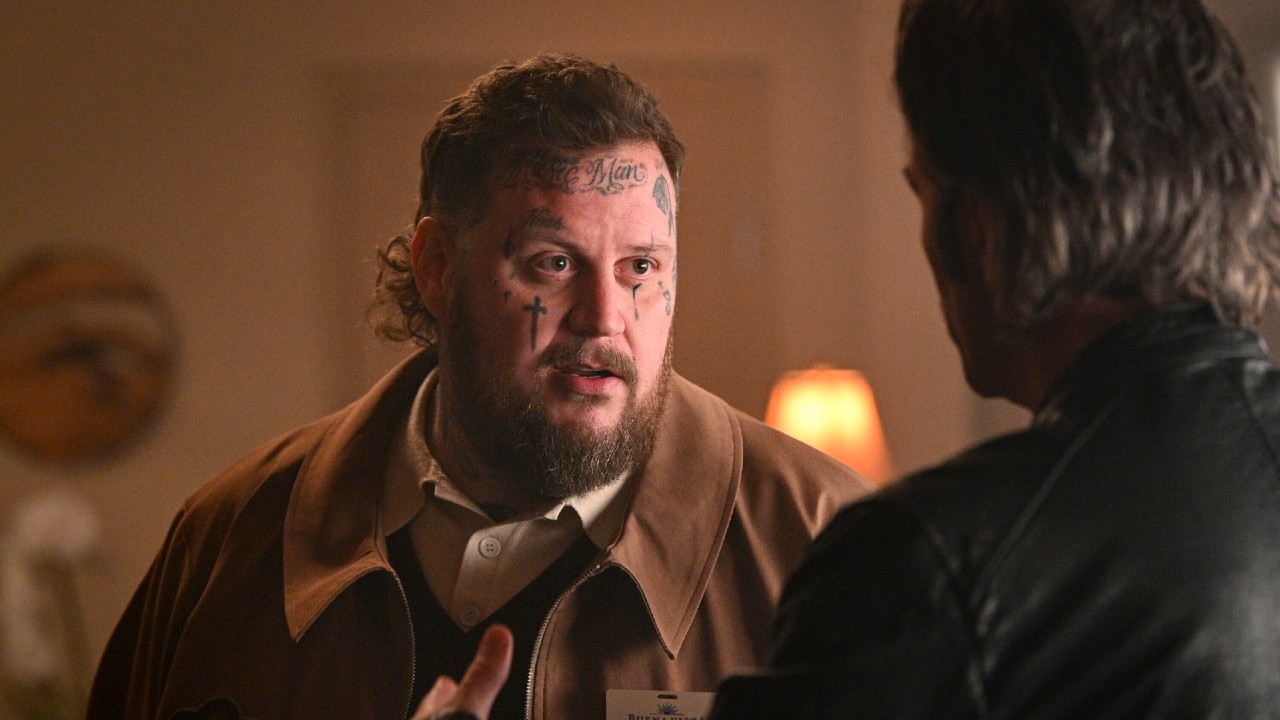Spartacus Blood & Death: 13 Epic Character Sendoffs

Throughout its three-season (plus prequel) run, Spartacus has featured some amazing characters with amazing stories and some especially memorable death scenes. In a series as violent and dramatic as this one, death is a near certainty. It's just a matter of when and how. We might go as far as to say that Steven DeKnight's drama has redefined how to write off a character in spectacularly bloody fashion. No one was ever truly safe from carnage on this series.
With the series finale set to air this week, we at TV Blend hoped to pay tribute to the show in some way. What occurred to us during that discussion was that most of our favorite or most memorable moments involved someone dying, as morbid as that may seem. It's a dark realization, but those averse to shows featuring blood and death probably aren't watching Spartacus. The series rarely sends a character to meet the gods without some creatively devised final scene, which - in many cases - honors who that character was and finishes off their story in a grand scene worthy of their place in the show. In some cases, the death in question was just really unforgettable and needed to be mentioned.
While the series finale will likely adds to this list, here are 13 character deaths from Spartacus we won't soon forget, in no particular order.
Spoilers from all four seasons of Spartacus - excluding the series finale. Some bloody, violent images included..
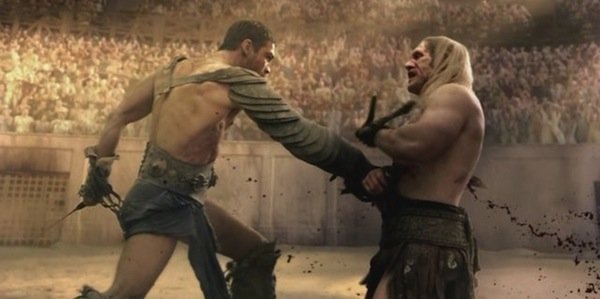
Theokoles
For a character who only appears in one episode, Theokoles is incredibly important to the larger story arc. His death in the arena, a vicious decapitation at the hands of Spartacus, both launches our hero’s legend to the outside world and forever unites him with Crixus. Neither of those things could have been accomplished had the Shadow of Death not been such a physically imposing and terrifying force. His name and his exploits were well known throughout not only Capua but the surrounding areas. He had credibility. He had power, and when Spartacus took his head, he stole quite a bit of it for himself. Even in later seasons, some of the slaves who join Spartacus' cause know him as the Bringer of Rain. Every hero needs a launching pad. Theokoles was Spartacus’ - even if he needed an assist from Crixus, which most people seem to forget about -in order to get off the ground.

Licinia should've stopped laughing.
CINEMABLEND NEWSLETTER
Your Daily Blend of Entertainment News
It seemed like Licinia was to Ilithyia what Ilithyia was to Lucretia. Status is everything among the Romans, and Ilithyia never seemed very comfortable in Licinia's presence, which isn't all that surprising as she was often slighted by the cousin of Marcus Crassus. They were ultimate frenemies, but with Ilithyia, there's a fine line between friend and enemy, and that line crumbled when Lucretia tricked Ilithyia into having sex with Spartacus, instead of Crixus. Lucretia took that even further by allowing Licinia to witness the situation, which would have been a major problem for Ilithyia on numerous levels. Licinia made the mistake of laughing over the ordeal, but Ilithyia didn't think it was very funny. Her rage bubbled over and she promptly attacked Licinia and bashed her face into the marble until there was nothing left. It was gross and horrible and amazingly violent, and it showed just how lethal the women on this series can be, not to mention Ilithyia's demonstrated vicious violent streak, when subjected to humiliation. Stop. Laughing!

Varro gets the thumbs down.
Varro's death may have been the first true indication that this show was going to pierce our hearts quite brutally. As Spartacus' closest friend at the ludus, Varro was often a source of humor, warmth and support for the gladiator. We got to know him a bit better, learning he was enslaved by choice to pay off a debt, and that he had a wife and an adorable curly-haired child to call his own on the outside. Varro ended up caught in the crosshairs of Ilithyia's vendetta against Spartacus. In her efforts to hurt him, she seduced young Numerius, a kid with the power of an adult but minimal compassion or value for human life. During what was supposed to be a fun exhibition at Numerius' birthday party, Spartacus took Varro down and turned to Numerius to give the official thumbs up to spare Varro's life. It was all meant to be for show, but with Ilithyia in his ear, Numerus gave the thumbs down, forcing Spartacus to kill his friend. Varro actually did the hardest part, pulling the sword into his own neck and leaving Spartacus to finish the job. It was heartbreaking and his absence was felt. And we learned from that point on that no one was safe and at any moment, this show could give the thumbs down to a beloved character.

Numerius feels Aurelia's wrath.
In the grand scheme of things, Numerius wasn't a major character, but he certainly left his mark, having been the one to decide Varro's fate. The young man, who was barely a man, paid for his poor judgment when he came face to face with Varro's wife, Aurelia, and it is really her involvement that earns Numerius a place on this list. During the mayhem at the villa at the end of Blood and Sand, Aurelia, who only recently learned that Numerius was to blame for her husband's death, found an opportunity to pay him back for taking the life of the father of her son. She pulled him away, assuring him safety from the fray, and instead, confronted him for what he did to Varro. Her delicate features distorted into murderous rage as she explained to Numerius that Varro wasn't a perfect man, but he was hers. He died to the words "He was mine!," only just barely seeming to grasp what was happening after she had the dagger in him three or four times. Hell hath no fury…

Melitta's honeyed wine.
Melitta may have died a cheater, but she certainly didn’t start out that way. We’re first introduced to her as Oenomaus’ trusted wife, but thanks to the foolish whims of Varis, she’s forced to sleep with Gannicus, who quickly ensnares her in his ruggedly handsome web. More often than not, she tries to get over her feelings, but ultimately, she can’t overcome her lust or more importantly, the batch of poisoned wine Lucretia cooks up for Titus that accidentally winds up in Melitta's cup. At the time, Gannicus and Lucretia do their best to cover up the exact circumstances surrounding her undoing, but eventually, the truth spills out, binding the cheating gladiator to the Doctore he betrayed and uniting them for a single cause. Melitta’s death might not be Gannicus’ finest moment, but it makes a man out of him and gives viewers arguably the series’ single most likable character.
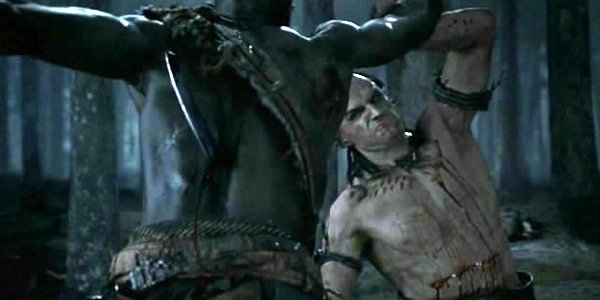
Oenomaus forgives Gannicus.
Oenomaus, known to many of Batiatus' gladiators as Doctore, was a truly beloved character who went out in a blaze of glory, fighting by the side of his old friend Gannicus until he was taken down by The Egyptian, a scary gladiator who also met his demise in the fight, courtesy of Gannicus. The fight itself made Oenomaus' death particularly memorable, but it was the resolution of the tension between Oenomaus and Gannicus that made the scene particularly heartbreaking. The two had a falling out when Oenomaus learned that Gannicus had a brief affair with his wife just before Melitta died. It seemed like their friendship would never be the same, but Oenomaus expressed genuine forgiveness with his dying words, telling Gannicus, "I go to my wife's arms. We shall greet you in the afterlife, Brother." Not only did it emphasize forgiveness, but also the love that the friends shared for one another. As hard as it was to see Oenomaus go, it was a relief to see that he could look at Gannicus as a brother again and maybe even lift some of the burden from his old friend's conscience.
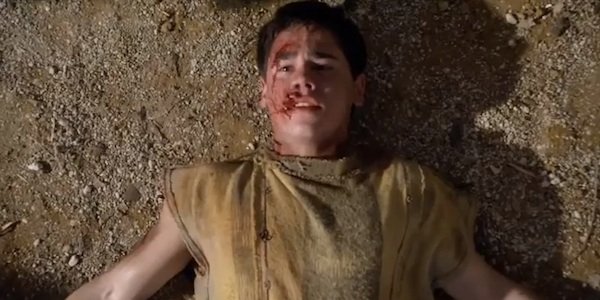
Tiberius gets stabbed in the back by Kore.
Tiberius might be one of the most insufferable characters on television this season, ranking up there with Game of Thrones’ Joffrey in despicableness. In order to give fans any sort of satisfaction, it seemed clear that Tiberius must die and do so in the least bold or brave manner possible. With the confidence and impetuousness only youth can bring, Tiberius raped his father’s lover, among others, lied to get ahead and brought shame to the Crassus family name. Only did he bring anything but shame to his name, yet as a warrior, he was still fooled by Spartacus’ gang.
After being forced into a makeshift gladiator ring, Tiberius almost gets to go to his death respectably; however, he is saved at the last moment by Caesar, who proposes a trade. Thus follows one of the longest five minutes of television airing in recent months. However, just as it seems Tiberius will get away with his nonsense one more time, his father’s lover, Kore, figures out how to get her revenge with a knife. A sweeter sacrifice has never before been a part of this series.
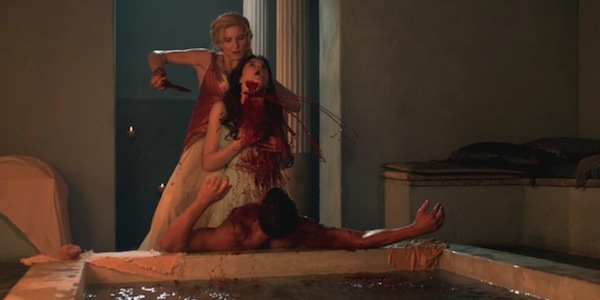
Seppia takes a bath.
Fluttery, beautiful, and youthful Seppia had the verbal wit to spar with contenders as experienced as the likes of Illythia and Lucretia. Unfortunately, her heart was never really in the game, and Seppia talked the talk without walking the walk. Just when it seemed the young Roman was finally spurred into action in Spartacus: Vengeance, taking on the task of killing the powerful Glaber, it turns out she was set up by the older and wiser Illythia and Lucretia.
Her death, unlike her character arc, was unforgettable, with Illythia appearing in time to “save” Glaber and cut the life from Seppia’s body, letting blood stream from her throat to turn the bath a crimson color. The bathtub imagery is something straight out of nightmarish version of an Edgar Allen Poe scene and would likely stick out as the most horrifying of the season, if Lucretia and Illythia hadn’t turned on each other, later. As if that weren’t vivid enough, Glaber and Illythia proceeded to have passionate, animalistic sex in front of Seppia’s corpse.
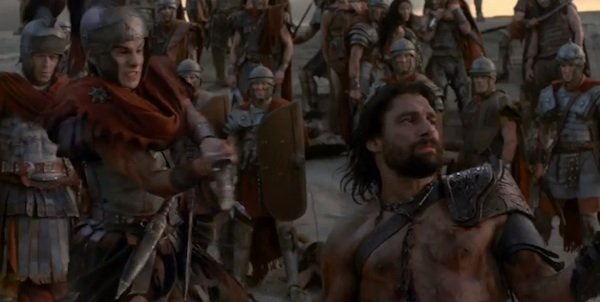
Crixus - The Undefeated Gaul
The latter half of Spartacus: War of the Damned set Crixus up to die, and to die a warrior’s death. Spartacus’ brother in the gladiator ring and later, general on the front line, seemed to be an unstoppable force. He almost bit the dust a few times, staying on the battlefield as the others retreated, but he prevailed and eventually decided to lead his own army to Rome, with Naevia at his side.
Audiences have been with Crixus for longer than any other major player in the Spartacus universe. We’ve seen his early days in the arena and his rise to become a major player in the rebellion. We’ve seen his romances and his heartbreaks, his proudest moments and his biggest defeats. Crixus was worthy of a death far greater than getting stabbed in the back by Tiberius, and in his final moments, the pain and horror in Naevia’s eyes expressed as much righteous anger at Crixus’ passing as they offered sadness and remorse. Even if Crixus was not given the death he deserved, his is by far one of the saddest passings, and audiences can take a little comfort in the fact that at least he went out while taking on a far larger army.
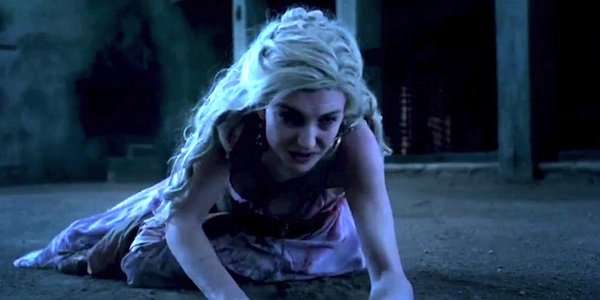
Ilithyia's forced C-section.
Spartacus has famously showed us dozens of ways most audiences wouldn’t want to die, but all of the show’s viewers who are also mothers were probably most affected by the death of Illythia. Proud and cunning, Illythia never stood out as a favorite hero or villain, but she did have the benefit of being pregnant during Spartacus: Vengeance, which gave her a healthy glow and inspired the hope that the character might learn to be a more selfless person in the future.
Unfortunately, there was no future to be had for Illythia. In a fit of madness or perhaps despair, Lucretia ripped the baby from the womb in a forced C-section that leaves Illythia bleeding out and helpless. She scrapped and crawled after Lucretia after getting cut, but her fervent love as a mother was not enough to keep Lucretia from dropping off a cliff into the abyss. Perhaps it would have been fairer if she had died before being forced to see the one thing she truly could find a heart for, a mere newborn, fall to its destruction.
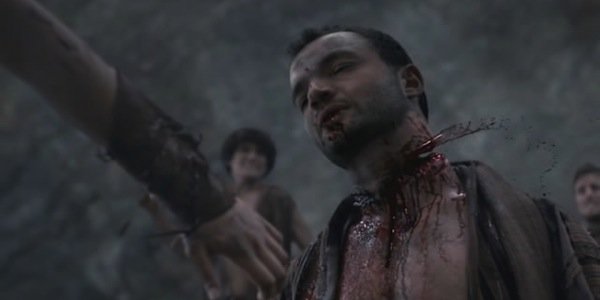
Ashur receives Naevia's vengeance.
While extremely skilled compared to the average person, Ashur is no match for the more talented among his fellow gladiators. That’s why he spends damn near the entire series scheming. He has to use his brain to get ahead. Unfortunately for him, all of the endless crosses and double crosses catch up with him, forcing the hobbled mercenary into a sword fight with Naevia. She’s got a laundry list of reasons to hate him and is deceptively good with the sword. Thanks to his arrogance, however, he fails to take her seriously, and she makes off with his head because of it. It’s a fitting end for a selfish and conceited asshole, and it’s actually a great moment in Naevia’s story arc as well, completing her transition from house servant to badass warrior woman.

Batiatus' slaves rebel.
Let’s just be honest. Quintus Batiatus is kind of a dick. In his effort to get out of his dad’s shadow, topple Salonius and get as powerful as possible, he makes quite a few sketchy choices. He makes Oenomaus’ wife Melitta, despite his own wife’s objections, sleep with Gannicus. He executes Barca for treason on the back of meritless allegations, and he murders Spartacus’ wife because of some stupid theory that he’ll somehow be less of a warrior if he’s happy. Somehow, despite it all, however, he’s actually kind of likable, which is why watching his slaves revolt and Spartacus slit his throat is more of a mixed bag than expected. Only in his death can all of his slaves leave to start the Third Servile Wars, but without him, the show loses a good bit of snark and scheming, as well as John Hannah’s brilliant acting.

Lucretia takes the plunge.
As hard as it was to see Lucy Lawless exit the series, can any of us truly regret Lucretia's dramatic departure from the drama? The cliff at Batiatus' ludus was such a massive presence in the first season of the series, always looming in the background, with no railing to keep the training gladiators from being knocked over the edge if push came to horrifying shove. Never could we have guessed that the drop would serve as the mouth to swallow up Lucretia, who never mentally recovered from the loss of her husband or her unborn child. Lucretia's choice to bring the baby with her to the afterlife took dark and disturbing to the next level. It was too horrible to be expected right until the moment we realized what she was about to do. Her only warning of her intentions to Ilithyia was to say, “Quintus always wanted a son, Because of you, we shall have one,” after which she tipped backward, clutching Ilithyia's baby to her chest and falling into nothing while the mother of the child watched on, near death herself. It was horrifying and disturbing and altogether the most insanely amazing departure we never could have imagined for any character.
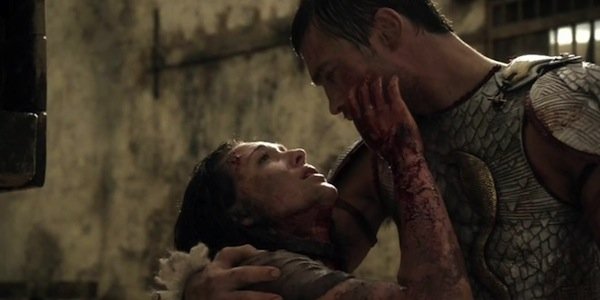
Honorable mentions...
Honorable mentions go to Gaia, who was brutally killed by Tullius and tossed over the cliff in absence of proper funeral. Glaber, who got a sword shoved down his throat at the end of Vengeance. Heracleo, who was a sneaky pirate and died by having a branding iron stabbed through his throat. Gross. Solonius gets a nod for dying laughing in the arena, just after Spartacus revealed intentions to kill Batiatus. Mira gets a nod for her loyalty and bravery, even after she knew Spartacus couldn't love her back. And finally, Sura. We never really got to know Spartacus' wife, but her death had such a huge impact on his character, serving as a driving force to Spartacus' determination to exact vengeance and earn his freedom, leading an army to do the same.

Kelly put her life-long love of movies, TV and books to greater use when she joined CinemaBlend as a freelance TV news writer in 2006, and went on to serve as the site’s TV Editor before joining the staff full-time in 2011 and moving over to other roles at the site. At present, she’s an Assistant Managing Editor who spends much of her time brainstorming and editing features, analyzing site data, working with writers and editors on content planning and the workflow, and (of course) continuing to obsess over the best movies and TV shows (those that already exist, and the many on the way). She graduated from SUNY Cortland with BA in Communication Studies and a minor in Cinema Studies. When she isn't working, she's probably thinking about work, or reading (or listening to a book), and making sure her cats are living their absolute best feline lives.



